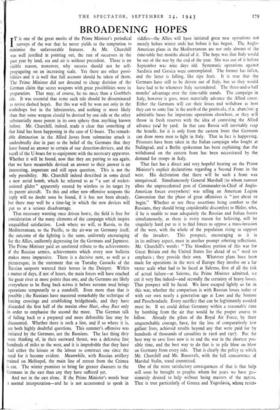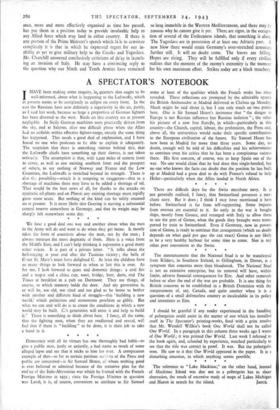BROADENING HOPES
T is one of the great merits of the Prime Minister's periodical I surveys of -the war that he never yields to the temptation to minimise the unfavourable features. As Mr. Churchill was well justified in pointing out, the run of successes in the past year by land, sea and air is without precedent. There is no visible reason, moreover, why success should not be self- propagating on an increasing scale. Yet there are other possi- bilities and it is well that full account should be taken of them.
The Prime Minister did not descend to cheap derision of the German claim that secret weapons with great possibilities were in preparation. That may, of course, be no molt than a Goebbels tale. It was essential that some such tale should be disseminated to revive dashed hopes. But this war will be won not only in the workshops but in the laboratories, and nothing is more likely than that some weapon should be devised by one side or the other substantially more potent in its own sphere than anything known before. Mr. Churchill, indeed, made it clear that something of that kind has been happening in the case of U-boats. The remark- able diminution in the Allied Josses from submarine attack is undoubtedly due in part to the belief of the Germans that they have found an answer to certain of our detection-devices, and the recall of the U-boats for re-equipment with the necessary apparatus. Whether it will be found, now that they are putting to sea again, that we have meanwhile devised an answer to their answer is an interesting, important and still open question. This is not the only possibility. Mr. Churchill indeed described in some detail a new aerial bomb, which he referred to as " a sort of rocket- assisted glider" apparently steered by wireless to its target by its parent aircraft. To this and other new offensive weapons the reply will no doubt soon be found, if it has not been already, but there may well be a time-lag in which the new devices will put us at a serious disadvantage.
That necessary warning once driven home, the field is free for zonsideration of the many elements of the campaign which inspire unqualified satisfaction. Look where we will, to Russia, to the Mediterranean, to the Pacific, to the air-war on Germany itself, the outcome of the fighting is the same, uniformly encouraging for the Allies, uniformly depressing for the Germans and Japanese. The Prime Minister paid an unstinted tribute to the achievements of the Russian armies, achievements which every new bulletin makes more impvessive. There is a decisive note, as well as a picturesque, in the statement that on Tuesday Cossacks of the Russian outposts watered their horses in the Dnieper. Within a matter of days, if riot of hours, the main forces will have reached the great river at more points than one, and the Germans are likely everywhere to be flung back across it before autumn mud brings operations temporarily to a standstill. Even more than that is possible ; the Russians have mastered remarkably the technique of forcing crossings and establishing bridgeheads, and they have discarded the first half of the maxim ohne Hast, ohne Rast only in order to emphasise the second the more. The German talk of falling back to a prepared and more defensible line may be discounted. Whether there is such a line, and if so where it is, are both highly doubtful questions. This summer's offensive was initiated by the Germans, not the Russians. The last thing they were thinking of, in their eastward thrust, was a defensive line hundreds of miles to the west, and it is improbable that they have had either the leisure or the labour to construct one since the need for it become evident. Meanwhile, with Russian artillery trained on Melitopol, the main line of retreat from the Crimea is cut. The winter promises to bring far greater disasters to the Germans in the east than any they have suffered yet.
And not in the east alone. If the Prime Minister's words bear a normal interpretation—and he is not accustomed to speak in riddles—the Allies will have initiated great new operations not merely before winter ends but before it has begun. The Anglo- American plans in the Mediterranean are not only abreast of the time-table but months ahead of it. The hope was that Italy would be out of the war by the end of the year. She was out of it before September was nine days old. Systematic operations against Sardinia and Corsica were contemplated. The former has fallen, and the latter is falling, like ripe fruit. It is true that the Germans have still to be driven out of Italy, but so they would have had to be whenever Italy surrendered. The three-and-a-half months' advantage over the time-table stands. The campaign in Italy, however it goes, must materially advance the Allied cause. Either the Germans will cut their losses and withdraw as best they can to some line :n the north of the peninsula, tt_u_ abanc:oni;g admirable bases for important operations elsewhere, or they will throw in fresh reserves with the idea of contesting the Allied advance yaril by yard. In that case Russia will inevitably reap the benefit, for it is only from the eastern front that Germans can draw more men to fight in Italy. That in fact is happening. Prisoners have been taken in the Italian campaign who fought at Stalingrad, and a Berlin spokesman has been explaining that the withdrawal on the eastern front has been necessitated by the demand for troops in Italy.
That fact has a direct and very hopeful bearing on the Prime Minister's explicit declarations regarding a Second Front in the west. His declaration that there will be such a front was unequivocal. Simultaneously General Marshall (to whom rumour allots the unprecedented post of Commander-in-Chief of Anglo- American forces everywhere) was telling an American Legion Convention that the phase of great offensives is " just about to begin." Whether or not these assertions bring comfort to the Russians, they should bring considerable discomfort to Hitler, who, if he is unable to man adequately the Russian and Italian fronts simultaneously, as there is every reason for believing, will be singularly hard put to it to find forces to oppose a mass-invasion of the west, with the whole of the population rising in support of the invaders. This prospect, encouraging as it is in its military aspect, must in another prompt sobering reflections. Mr. Churchill's words: " The bloodiest portion of this war for Great Britain and the United States lies ahead of us " need no emphasis ; they provide their own. Whatever plans have been made for operations in the west of Europe they involve on a far vaster scale what had to be faced at Salerno, first of all the risk of actual failure—at Salerno, the Prime Minister admitted, we cut it very fine indeed—and secondly the certainty of heavy losses. That prospect will be faced. We have escaped lightly so far in this war, whether the comparison is with Russian losses today or with our own nearly a generation ago at Loos and the Somme and Passchendaele. Every sacrifice that can be legitimately avoided must be. If we could defeat Germany within a reasonable time by bombing from the air that would be the proper course to follow. Already the pilots of the Royal Air Force, by their unquenchable courage, have, for the loss of comparatively few gallant lives, achieved results beyond any that were paid for by hundreds of thousands of casualties in 1916 and 1917. But :he best way to save lives now is to end the war in the shortest pos- sible time, and the best way to do that is to pile blow on blow on Germany from every side. That is clearly the policy to which Mr. Churchill and Mr. Roosevelt, with the full concurrence of Marshal Stalin, stand committed.
One of the more satisfactory consequences of that is that help will soon be brought to peoples whom for years we have pas- sionately desired to help without being masters of the means. That is true particularly of Greece and Yugoslavia, whose resist-
ance, more and more effectively organised as time has passed, has put them in a position today to provide invaluable help to any Allied force which may land in either country. If there is any portion of the Prime Minister's speech which fals to convince completely it is that in which he expressed regret for our in- ability as yet to give military help to the Greeks and Yugoslays. Mr. Churchill answered conclusively criticisms of de!ay in launch- ing an invasion of Italy. He may have a convincing reply to the question why our Ninth and Tenth Armies have remained
so long immobile in the Western Mediterranean, and there may be reasons why he cannot give it yet. There are signs, in the occupa- tion of several of the Dodecanese islands, that something is afoot. The Yugoslays are in possession of at least one Adriatic port. A new blow there would strain Germany's over-stretched resources further still. It will .no doubt come. The leaves are falling. Hopes are rising. They will be fulfilled only if every civilian realises that the moment of the enemy's extremity is the moment for his own maximum effort. Strikes today are a black treachery.



























 Previous page
Previous page